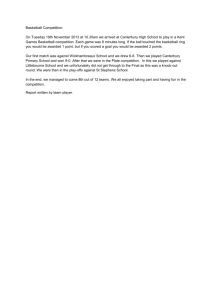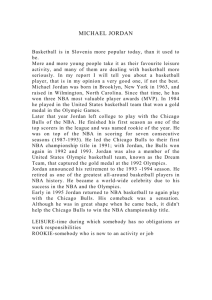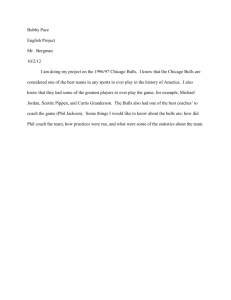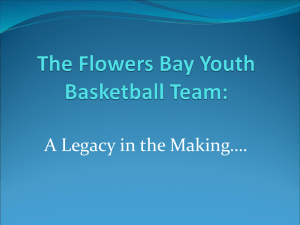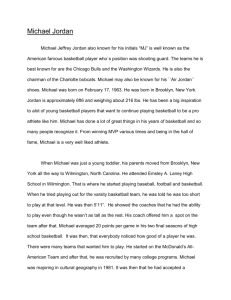Video ID: 627 Interviewee: Rodney McMahan Transcribed by
advertisement
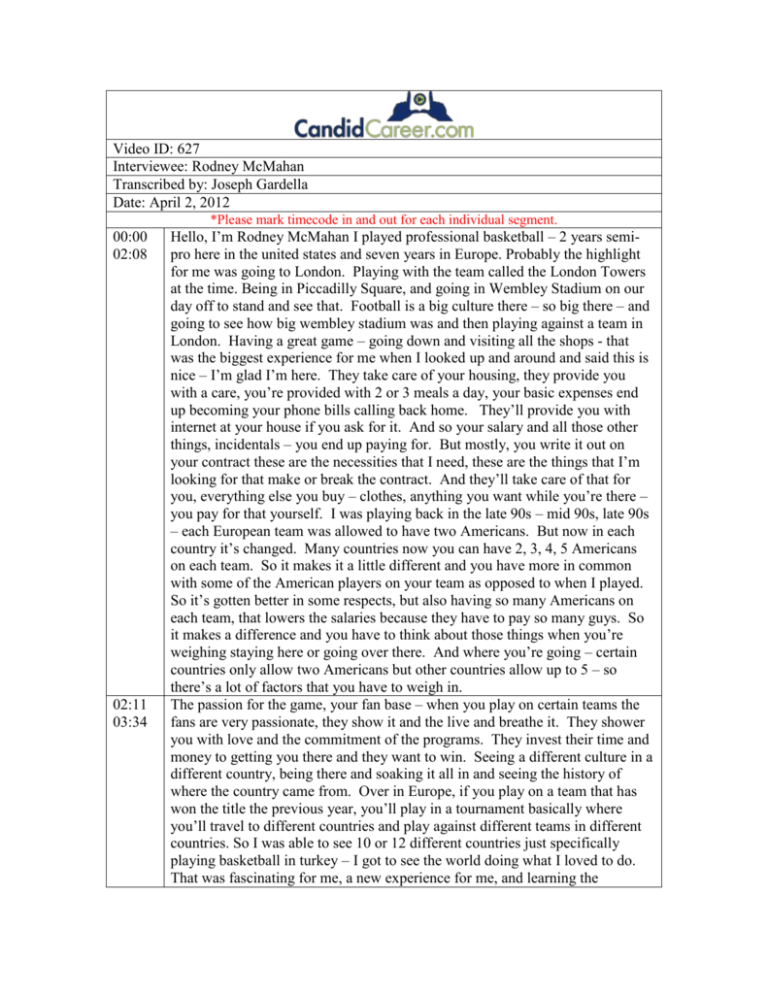
Video ID: 627 Interviewee: Rodney McMahan Transcribed by: Joseph Gardella Date: April 2, 2012 *Please mark timecode in and out for each individual segment. 00:00 02:08 02:11 03:34 Hello, I’m Rodney McMahan I played professional basketball – 2 years semipro here in the united states and seven years in Europe. Probably the highlight for me was going to London. Playing with the team called the London Towers at the time. Being in Piccadilly Square, and going in Wembley Stadium on our day off to stand and see that. Football is a big culture there – so big there – and going to see how big wembley stadium was and then playing against a team in London. Having a great game – going down and visiting all the shops - that was the biggest experience for me when I looked up and around and said this is nice – I’m glad I’m here. They take care of your housing, they provide you with a care, you’re provided with 2 or 3 meals a day, your basic expenses end up becoming your phone bills calling back home. They’ll provide you with internet at your house if you ask for it. And so your salary and all those other things, incidentals – you end up paying for. But mostly, you write it out on your contract these are the necessities that I need, these are the things that I’m looking for that make or break the contract. And they’ll take care of that for you, everything else you buy – clothes, anything you want while you’re there – you pay for that yourself. I was playing back in the late 90s – mid 90s, late 90s – each European team was allowed to have two Americans. But now in each country it’s changed. Many countries now you can have 2, 3, 4, 5 Americans on each team. So it makes it a little different and you have more in common with some of the American players on your team as opposed to when I played. So it’s gotten better in some respects, but also having so many Americans on each team, that lowers the salaries because they have to pay so many guys. So it makes a difference and you have to think about those things when you’re weighing staying here or going over there. And where you’re going – certain countries only allow two Americans but other countries allow up to 5 – so there’s a lot of factors that you have to weigh in. The passion for the game, your fan base – when you play on certain teams the fans are very passionate, they show it and the live and breathe it. They shower you with love and the commitment of the programs. They invest their time and money to getting you there and they want to win. Seeing a different culture in a different country, being there and soaking it all in and seeing the history of where the country came from. Over in Europe, if you play on a team that has won the title the previous year, you’ll play in a tournament basically where you’ll travel to different countries and play against different teams in different countries. So I was able to see 10 or 12 different countries just specifically playing basketball in turkey – I got to see the world doing what I loved to do. That was fascinating for me, a new experience for me, and learning the 03:37 04:43 04:46 08:06 language and the food, all the experiences there – it was something I wanted to be part of and be see for myself first hand and I enjoyed it. If guys are open to those kinds of things and want to see it, I suggest they do it. It’s not as easy as people may think. You’re playing in a different country, different language, different culture, different experiences; you have issues that you have to deal with – food, convenience, payment depending on where you go. As of now, after going through it myself, because I left school and then came back and graduated, I was fortunate enough not to have to pay when I went back to get my degree. Looking back on it, I wish I went ahead and did all the basketball things that I did my four years, and yet, gone ahead and had my plan b – finishing my degree on time and quite honestly, if I had taken enough classes to go ahead and try to work towards getting a graduate degree while in school in my four years, that’s what I would recommend because its so difficult – one in a million to make it to the nba. When you get overseas, they’re so many issues you have to deal with. Or in the d-league so many different guys trying to do the same thing you’re doing. I think having a plan b now is very important and looking at the big picture – because you’re not going to able to play basketball for all your life – and so the realistic thing to think about is to say what if I get hurt tomorrow and they have to cut me, what am I going to do? And so, you never know, that could be the last time you dribble a basketball. So I think having a plan b is very essential. Honesty, in ’95 – when my four years ended at Vanderbilt – I didn’t graduate, I wanted to pursue professional basketball. So I left at the end of ’95 – in the summer rather - and started playing semi-pro basketball for a couple months and then I tried out for the Chicago bulls. I didn’t make the team but was on the last cut and stayed in Chicago in the cba which I a minor league of the nba. I did that for a year and the following summer I played semi pro again and tried out for the bulls again. I did not make it, went back to the cba for two months, and after that short stint – I hoped, I wanted to go over seas to Europe. So I got an offer to go over seas to Europe in august in ’97 so I went there. (Did you play for one team over there?) No every year I was in Europe I played for a different team in a different city. I started my first year in Budapest Hungary – played there for ten months – and got to travel and play on a really good team – came in second. And my second year I went back to Hungary again and played for another team in a different city called page – we finished third that year. So after that I wanted to try something different and to south America – I went to Argentina. So I played in Argentina – enjoyed it – played there for a year – and after that I went back to Hungary and played on three different teams there. My things that hurt me – my size – I was 6’5 in height but I was light – I was only185 – so size and strength was a big thing for me. For my position, playing a shooting guard, I was a streaky shooter – at times I made shots at times I didn’t. What helped me and what the Chicago bulls liked about me, was that I was versatile. I could handle the ball, I could rebound, defend, and I could make shots for the most part – that helped me for the most part. But ultimately, I didn’t shoot the ball good enough and I wasn’t strong enough and quite frankly, it was probably the best team history has ever seen a - 72-10 team – 08:08 and they did not have a roster spot for me. And so no other nba teams gave me an offer to try out but the Chicago bulls did. It’s kind of frustrating – you can’t understand why that is the best team in the world wants you to try out and yet no one else wants you to try out, but I fit their system – I knew the triangle system – we ran it a couple years in college with jam vertikov was our coach. As I said, I was versatile and able to do a lot of things, but I wasn’t great at just one thing. With the nba, a lot of teams are looking for a perfect fit, or a perfect role guy to fit specifically what they need. Unfortunately, I wasn’t able to do that for them. Usually, throughout your college career and my senior year in particular, I had different agents send me letters saying they would like to represent me. So after I finished playing at Vanderbilt, I went with an older, experienced agent who had many guys overseas and many guys in the nba. And my first two years, he felt like after I tried out for the bulls so well, it was better for me to try out in the states, see if get a shot with an nba team, and then after that try to peruse the European thing. So that’s what I chose. (Q: Any Final Advice) I would tell them to value their time where they’re at. I would tell them to not hold back and hold any regrets. Don’t sit back tomorrow and think about what you could’ve done today to done that. I would say if you’re going for basketball, go all out. If you’re going for an education – get your degree or whatever you’re perusing. Academically, I would say peruse it with all your passion and your heart because there’s no grantees at anything. The way the job market is right now, it going to be very difficult if you’re playing basketball or if you’re going for a job - don’t leave any stone unturned just peruse with all you can. (Q: From a technical standpoint – going through the try-outs with the bulls – what are they looking for what would you tell them they need to work on this part of your game.) Knowing what your strengths and weaknesses are very key. If a team invites you to camp, they know exactly what you can do for them, so concentrate on those skills, and having an understanding of alright, this is what I’m weak at. Staying away from your weaknesses and showing them your strengths can help an nba team. For me, I had such a great camp with the bulls my first time, I kind of felt like I’ve done enough, instead of continuing to push – even though I was last cut, I didn’t make the team. But they asked me to play for Chicago, the semi-pro team there, and I was working out with the bulls twice a week. So they felt like I was good enough, on the verge, and yet I hadn’t pushed through. I took that as well I’m good enough to be here – when a spot opens, they’ll bring me in – and I relaxed instead of pushing through even harder. But guys never relax, never settle, never sit back, never be satisfied, keep your hunger, because there is always someone behind you ready to take your spot. END
